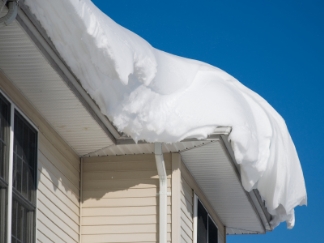Simple steps save thousands in winter weather costs
Chris Kissell
Old Man Winter is waiting, ready to make his annual appearance so he can wreak havoc on homes everywhere.
In the U.S., low temperatures, ice and snow caused $81 million in winter weather-related damage in 2012, including $38 million in insurance losses, according to the Insurance Information Institute III). In 2011, such damage reached a whopping $2 billion. 
“Most people don’t realize the high price a snow storm or low) temperatures can exact for damage that is often preventable,” says Carole Walker, executive director of the Rocky Mountain Insurance Information Association.
For example, a burst frozen pipe can cause thousands of dollars in damage. Ice dams can spread under shingles and lead to leaky roofs once the snow melts. And a blocked chimney can create a winter-weather fire hazard.
If winter weather damages your home, chances are good your home insurance policy will pick up the tab for repairs. According to III, covered damages typically include:
- Burst pipes.
- Ice dams occurs when water builds up behind ice blockage).
- Wind damage caused by weight of ice or snow.
- Fire-related losses.
However, a few simple precautionary measures can prevent such damage from occurring in the first place.
How to prepare your home for winter weather
Fall is the time to prepare your home for winter. Ideas for getting it ready include:
- Clean gutters and leaves so water can escape. Janet Patrick, spokeswoman for the Illinois Insurance Association, says, “Ice dams can cause roof damage and interior water damage.”
- Repair roof leaks and insulate pipes. Use standard insulation materials, newspapers or plastic.
- Fill foundation cracks that allow cold air to flow into the basement or crawl space. “Freezing temperatures can lead to water pipe problems,” Patrick says.
- Make sure your house is ready for high winds and heavy snows. “Cut away tree branches that could fall on a house or other structure during a storm,” says Michael Barry, an III spokesman.
- Prepare for a loss of power that could last hours, or even days. “Stock up on fuel in case of a power outage, such as firewood or propane if you have a backup heat source,” Walker says.
Burst pipes
Once winter is under way, you’ll need to react quickly when the elements threaten damage to your home. Here are three ways to prevent pipes from bursting, or from causing excessive damage if they do burst.
- Keep your home warm. Walker urges you to keep your home warmed to at least 65 degrees.
- Allow faucets to drip a bit during winter’s coldest weather. “Running water — even at a trickle — helps prevent pipes from freezing,” Barry says.
- Know how to shut off water valves. That way, you can prevent unnecessary extra damage after a pipe bursts, Barry says.
Heavy snowfall
Excessive snowfall is often the source of water damage. To prevent this, try the following:
- Don’t let piles of snow accumulate on the roof. Excessive snow is most likely to collect on the downwind side of the roof. Walker suggests contacting a roofing contractor to get a referral to a professional who can remove snow from a roof safely, without causing damage to the shingles.
- Make sure sewers and drains are clear. Melting snow can back up sewers and drains, allowing water to seep into your home and cause flood damage. “Local government officials should be notified if street drains are clogged,” Walker says.
Fire hazards
Finally, winter raises the risk for some fire hazards. Here are some steps for lowering that risk:
- Check, clean and maintain all fireplaces before using them. These may include furnaces, fireplace, chimneys or wood stoves.
- Use common sense with holiday light displays. “Do not overload electrical outlets or extension cords,” Patrick says.
How to weather-proof your home
The Insurance Information Institute also recommends the following tips for keeping the snow and cold out of your home this winter, and for keeping your family safe from fires.
- Use weather stripping, with materials such as vinyl, rubber or polyfoam, to seal skylights and other roof openings.
- Insulate attics so heat doesn’t escape to the roof. Excess heat loss can cause repeated thawing/re-freeze cycles that lead to ice dams. Attics should be 5 to 10 degrees warmer than the outside air.)
- Insulate basements and crawl spaces to prevent pipes from freezing.
- Install and test smoke and carbon monoxide detectors.
- If you’re a snowbird who plans to winter away in more tropical climes, turn off the water before leaving and consider having a professional drain your pipes to keep them from freezing and bursting.
Also, ask someone to watch your house during the cold winter months and check inside occasionally – especially after cold and snow events – to make sure any problem that arises can be quickly fixed.
See how much you could save today on your home insurance. Get your free home insurance quotes today!
